The Universal Mission of Holy Prophet Muhammad (S.A.W.)
Wilson The history of the Prophet informs us that at the age of forty, while he was worshipping on Mount Hira, the light of God shone upon him and he heard the voice of the Truth. At that moment his commission as a messenger of God to  mankind commenced. What did the message of Hira reveal to Muhammad (S.A.W.)
mankind commenced. What did the message of Hira reveal to Muhammad (S.A.W.)
Chirri The message of Hira revealed to the new prophet the facts that belong to the true concept of the True God The power of creation, the power of transforming clay into a human being, and the power of making the matter conscious of

itself and of the world. The power of making the matter conscious is clearly demonstrated by the human knowledge and the human capability of writing, which is the foundation of the world civilization. From the Holy Qur’an
Read in the name of thy Lord Who creates, Who created man out of clay. Read and thy Lord is the Most Generous,-Who taught by the pen. Who taught man what he knew not. 961-5 Wilson How does Muhammad (S.A.W.) stand among the prophets
He stands in the record of the major prophets with clear distinctions
1. He is a part of both world and religious histories. His message was an important factor in changing the history of the world, and no historian doubts his existence and his role in world events.
2. He is the only prophet who witnessed with his eyes the growth of his religion until it was adopted by a whole nation during his lifetime.
3. He is the universal prophet who was sent, not to a particular nation, such as the Arabs or the Hebrews, but to all mankind. From the Qur’an
Say, O mankind, I am the Messenger of God to you all, of Him Whose is the kingdom of the heavens and the Earth…. 7158 4. His message clearly opposed all sorts of racial discrimination. Removal of all social barriers is an essential part of his message. White, black, red, and yellow are equal.
No race is superior to another race, and no nation is inferior to another nation. Man is to be praised or blamed only for what he does by his own choice. Being related to a particular nation or race is not our choice, nor is it of our own making. Our distinction can come only through our good deeds.
From the Holy Qur’an
Certainly, the noblest among you in the eyes of God is the most righteous of you. 4913 5. He founded and established, during his lifetime, a powerful state, based on high ideals. The Muslim state was born in an age in which the government was conceived as a ruling body, superior to the people and imposed on its subjects without their choice. The people themselves never conceived their equality to their rulers, nor believed their equality to one another.
In the teaching of Islam, the opposite is true. The government is a fruit of people’s belief in one set of guiding principles. It is the legitimate child of their spontaneous cooperation for promotion of such principles. Thus, the promoters of such principles are related to each other and considered to be one brotherhood.
6. He defeated all his opponents, and no party was able to defeat him.
7. He is the prophet who declared the religious freedom when he was powerful enough to deprive many people of such a freedom. He and his followers were persecuted for thirteen years. He never spoke of religious freedom when they were subject of persecution. When he defeated all his opponents and was able to penalize the oppressors, he announced the following declaration
There shall be no compulsion in religion; the right direction is, henceforth, distinct from error. 2256
8. He is the only prophet who declared himself as the Final Prophet whose death concludes the long history of prophethood. Prophethood was claimed by many individuals after Muhammad (S.A.W.), but none of them was able to substantiate his claim. And now, after so many centuries since his death, Muhammad (S.A.W.) is still standing in the history as the Final of the prophets.
9. He is the only Prophet who introduced to the world a book that does not contain any human word. The Qur’an is not a dialogue between God and man, as the rest of the holy books; it is only the words of God which He put in the mouth of Muhammad (S.A.W.) to be transmitted through him to mankind.
Wilson It is puzzling that the prophets who preceded Muhammad (S.A.W.) such as Moses and Jesus had been empowered to perform remarkable and supernatural works, while Muhammad (S.A.W.) did not show, or rather did not rely on miraculous actions. He only relied, in proving his prophethood, on the Qur’an. Why didn’t he perform miracles similar to those of Jesus and Moses
Chirri There are two reasons for the difference between the type of Muhammad (S.A.W.) ‘s miracle and the types of miracles of those prophets who preceded him
1. The miracles of Jesus and Moses, it is true, were very remarkable; but the fact remains that in spite of their remarkability, they did not induce the people of their times to believe in those prophets or to adhere to their teachings. History informs us that the Israelites did not follow the Prophet Moses after he showed them all his wonders.
After they crossed the sea on their feet, they showed no true adherence to his teaching. After he went to the mountain to receive the commandments, he came back to find them straying from the Divine road. Jesus was followed by multitudes, but when the crisis came, he was deserted even by his own disciples.
People, in general, never were induced by those wonders to adhere to the heavenly teachings. When they witnessed supernatural performances, the majority of them called their performers magicians and impostors.
Had the same kind of miracles been repeated at the time of Muhammad (S.A.W.), it would not have produced better results than it did before. For this, the type of miracles had to be changed .
2. Suppose that those miracles of Moses and Jesus were very productive, causing their witnesses to believe in the truthfulness of their performers. The fact remains that they were not permanent but only temporary miracles. No action can be seen twice. No action would last long. Making a blind see his way or bringing a dead back to life is a remarkable action, but such an action disappears as soon as it is done. As soon as the action is finished, it becomes history. Those who did not see it have to rely on the testimony of those who had seen it.
A prophet that will be followed by another prophet may rely on a remarkable performance in convincing his contemporaries. He does not have to worry about the future generations who will not see his miracles, because he can rely on the prophet who will come after him at a different period. The subsequent prophet will perform his own miracles, and he will endorse the prophet who preceded him.
With Muhammad (S.A.W.), the case is different. He was the Final of the prophets. He could not rely on any miraculous action, because no action can last long enough to be seen by other generations. Nor could he rely on the endorsement of a subsequent prophet, because he is the Final of the prophets. He had to rely on some miracle, but his miracle must be from a different type. It has to be a lasting miracle to be witnessed and tested by the future generations as well as by his contemporaries.
In a time when there was neither camera nor film to make one action witnessable at various times, we cannot conceive any kind of lasting miracles except the type of speech. When a speech is superb and recorded in a book, its superiority can be witnessed and tested at any time by any generation. If it is unmatchable, it will stay so forever, and its superiority can be judged by all generations. This is the type of miracle which is fitting for a final prophet, and this was the reason why Muhammad (S.A.W.) was equipped with the Holy Qur’an as evidence of his truthfulness.
More Evidence on His Prophethood
Wilson With the appreciation of the Arabic-speaking people and their respect for the Qur’an, I am inclined to believe in its superiority. As a matter of fact, history does not record any successful attempt by any individual or group to match the Qur’an. We know that the Arabic-speaking people were not all Muslims at any time.
We know also that the Arabs at the time of Muhammad (S.A.W.) were very skillful in oratory, and we know that the majority of them were violently opposed to Islam. The Qur’an challenged them and the future generations to match it, but it seems that the opponents of Islam did not accept that challenge at any time.
The superiority of the Qur’an is a fact and beyond any reasonable doubt. But I would like to know if the Qur’an has anything, besides its superiority and beautiful style, that supports its being a true revelation of God and that Muhammad (S.A.W.) is truly His prophet. Chirri There are in the contents of the Qur’an more than one prediction dealing with the future, and those predictions are fulfilled. Knowledge of the future is possible only to God and unavailable to any human being.
Man has advanced so far in science and technology to a stage undreamed of before. With all his advancements in knowledge, he is still unable to foresee the future. The most civilized nations wage wars against each other, and none of them is assured of victory. Should the knowledge of the future be available to them, they would have avoided destructive wars. A nation that foresees its defeat would refrain from entering any war that will be concluded by its defeat .
To recognize the human inability of foreseeing the future, we need only to remember our election campaigns. In spite of all the information which is obtained through our modern media and scientific methods, none of the candidates is sure of his victory or defeat until the votes are counted . There is a great deal of information contained in the Holy Qur’an dealing with the future which could not be humanly predicted.
Those predictions were fulfilled, and their fulfillment indicates that the Qur’an is a true Divine revelation and that Muhammad (S.A.W.) is a true messenger of God. Some of those prophecies deal with the future of the Holy Qur’an itself. Of these prophecies are the following
1. Certainly We have revealed the Reminder (the Qur’an), and we shall preserve it. 159
This verse informs us that the Qur’an shall not perish. It shall not disappear from this world, and it will last and continue forever.
This prediction was actually the opposite of what was humanly expected. The Qur’an was introduced by a prophet who was unschooled and unable to read or write. He introduced it in a language of an illiterate nation. The Arabs at the time of the Prophet did not have a hundred readers in a million. In addition to this,
the overwhelming majority of that nation was standing against the Prophet and his book, and so was the rest of the world. Under these circumstances, such a book was expected to perish and disappear. The chances of its continuity for so many generations were very slim. 2. The following verse explains
It (the Qur’an) is an invincible book. Falsehood does not invade it neither from before it nor from behind it, a revelation from a Mighty, Praised One. 4141-42
This verse informs the world that the Qur’an will not be interpolated by words that had been said before the time of its revelation nor by words that will be said after the time of its revelation. It will be pure and will continue so forever.
This, also, was a prediction contrary to what was humanly expected. A book, introduced under the circumstances which we advanced, could not be humanly expected to stay pure without any interpolation.
There was no printing-machine at the time of revelation, nor such a machine was invented until several centuries after Muhammad (S.A.W.). History shows us that no holy book had remained pure without interpolation. The holy books had undergone many changes in many centuries. The Qur’an was expected not to be exceptional.
The two prophecies had been entirely fulfilled. The fulfillment of the first is self-evident The Holy Qur’an did not perish. It lived and remains a highly living book. Actually the life of the Qur’an is so rich that it may be the most recited book in the world. Every Muslim is expected to pray five times a day, and each prayer includes a recital from the Holy Qur’an. Hundreds of millions of Muslims perform their daily prayers, and hundreds of millions of times the Qur’an is daily recited.
The fulfillment of the second prophecy is quite obvious. The Holy Qur’an remained unchanged. No human word was inserted into it. Even the critics of Islam testify for the remarkable purity of the text of this great book. The words of the Qur’an which we read now are exactly the same words which were recited by the Prophet Muhammad (S.A.W.) himself, without subtraction or addition.
3. The Holy Qur’an contains many statements by which the opponents of Islam were invited to produce any Arabic discourse that would compare to the Qur’anic discourse. One of these statements is the following
Say If all men…. will unanimously determine to challenge the Qur’an, they will not produce its equal, even if they combine their efforts. 1788 This statement not only challenges mankind to compose speeches and discourses comparable to the Qur’an, but also predicts clearly that any such attempt will fail, and the Holy Qur’an will remain superior to all other Arabic discourses.
This statement is very far reaching. It tells that the Holy Qur’an will not be equalled, neither at the present nor in the future. Such a statement is a prediction in a very unexpected direction. We know that the human talent and skill are always evolving and improving. This is true in any field. A scientific invention, regardless of its remarkability, is always expected to evolve and improve through additional knowledge and technology. The first plane that took off the ground, no doubt, was very remarkable, but it cannot compare to any of the planes of today.
Let us assume that the inventor of that first aircraft had predicted that his plane will not be equalled in the future. Such a prediction would be very absurd and will be disproved within one decade because it is opposed to the natural course. Muhammad (S.A.W.) recited this statement which is contrary to the natural course.
He uttered these words about fourteen centuries ago, but his statement is still standing, and the events of the world could not disprove it. On the contrary, the statement now appears to be more meaningful than ever before. The older the prophecy becomes, the more truthful it will appear.
There is another amazing point in this prophecy. It is conceivable to challenge a certain class of people in a field which is not accessible to everyone, such as a special scientific field. We may conceive a gifted scientist, discovering a scientific secret not accessible to any other expert in that field. If such a scientist claims a permanent superiority in his invention, he would be challenging just a limited number of scientists.
With the Qur’an the case is different There is nothing special in it; its discourse is composed of words and sentences with orders known, not only to a limited number of experts, but to all Arabic-speaking people.
There isn’t any secret that is hidden from the rest of the people. All of it is known. The challenge, therefore, is not directed to a limited number of people; it is directed to the millions in every generation. With such a universal challenge, in no field of specialization, the failure to produce a match to it is much more remarkable than the failure of a few experts in a field of specialization.
This would be more amazing when we remember that no scientific secret or discovery has remained unmatchable. The highest secret in this century was the secret of the atomic bomb. It was the most important discovery or invention in this century. In spite of its great importance, it could not be kept exclusive for the country which produced it. Other countries tried to produce the same and succeeded.
Why did the Holy Qur’an remain superior and beyond any other Arabic discourse How did mankind refuse to accept the challenge
Either the Qur’an is truly superior and beyond the reach of any talented individual or group in any generation (and this means that it is a miraculous book), or it is within the reach of the people, but God miraculously prevented mankind from producing a similar discourse. In either case, the prophecy has been fulfilled, and the Qur’an is still standing unequalled.
More Evidence Forecasting the Future of Islam
Wilson From reading the history of Islam, it seems that the future of the new faith and of its followers was very doubtful at the time of the revelation. The success of Islam afterwards and the growth of the numbers of its followers were unexpected. I often wondered if the unexpected success and rapid growth of Islam were foreseen by the Prophet and forecast by the Qur’an.
The forecast of this would be an impressive evidence on the truthfulness of Muhammad (S.A.W.), because the future of the whole faith and its followers seemed to be very dark at the time of revelation.
Chirri The Holy Qur’an contains definite prophecies dealing with the future of Islam and its followers.
One of those prophecies deals with the future of the Muslims. It assures the Muslims of a future religious freedom and promises them a mighty state
God has promised those of you who believe (in Islam) and do good that He will surely make them rulers in the Earth, as He made those before them rulers, and that He will surely establish for them their religion, which He has chosen for them, and that He will surely give them the feeling of security in exchange of their fear, so they will worship Me, not associating aught with Me; and whoever is ungrateful after this, they are the transgressors. 2455
When this prophecy was revealed, the followers of Islam were a very small minority of the inhabitants of Al-Hijaz. It was revealed, approximately, in the fifth year after the Hijrah when the Muslims were a few thousands, bitterly antagonized by all the inhabitants of Hijaz and the rest of the Arabian Peninsula. None of the Muslims at that time had a feeling of security, nor were they able to practice their religion freely. There was nothing indicating that such a hated and bitterly fought minority would survive, nor was the future of this new religion humanly predictable. In spite of all these facts, the prophecy was revealed in a definite and unconditional form.
More prophecies are contained in the following verses which predict the triumph of Islam and the defeat of its opponents.
They desire to put out the light of God with their mouths, but God will perfect His light, though the disbelievers may be averse. 932; 618 He is the One Who sent His Messenger with the guidance and the true religion, to make it outweigh all other religions though the polytheists may be averse. 933; 619 and 4828.
The first verse predicts that the opponents of Islam will not succeed in putting out the light of God, nor will their attacks hinder its growth. God will make His light, Islam, perfect, though its opponents will oppose it strongly. They may argue, fight, assail and mobilize all their intellectual and material forces, determining to revoke Islam, but all that will not extinguish its light, nor will that prevent it from becoming full. Both verses predict definitely and unconditionally the victory of Islam over its opponents.
When this prophecy was revealed, the small Muslim community was defending itself against the Polytheists and other hostile elements in Arabia. Afterwards it had to defend itself against the Persian and Byzantine Empires.
Each of these powers was incomparably greater and richer than the Muslim state. The Persian and Byzantine Empires were the outstanding forces in the world. To defeat them both is to defeat all considerable forces in the world and to become the world’s superior power. This would fulfill completely the meaning of the prophecy, but this was seemingly impossible. We always expect the defeat of any single and relatively weak army when forced to combat on more than one field more than one superior power. This becomes clear when we remember that the mighty German army had been defeated twice in the twentieth century, only because it was fought by stronger allies on more than one front.
It may be the most remarkable military event in history, that the inhabitants of Madinah and Makkah, whose number did not exceed a few thousands, could defend themselves, after the death of the great Prophet, against the attacks of the apostate Arabs. With the exception of the Muslims of these two cities, almost all the Arab nation had apostatized after the death of the Prophet.
The Muslim state was compelled, afterwards, to fight against the Byzantine and Persian Empires. These two great empires fought the Muslims simultaneously on two different fronts. The scanty Muslim forces were forced to divide themselves in order to maintain the defense. The result was a wondrous military phenomenon. The two great powers were vanquished and Persia was completely defeated.
Within one hundred years, the vast area extending from the Atlantic Ocean to India, came under the rule of Islam. Those poor and helpless people, at the time of the revelation of this prophecy, suddenly became the superior power of the world. The Prophet, relying on the heavenly information, had forecast this triumph which took place after his death. Speaking to Odey, son of Hatam (a Christian chief who joined the new faith afterwards), the Prophet Muhammad (S.A.W.) uttered the following
. . .Thou dost not incline to Islamism, continued Muhammad (S.A.W.), because thou seest we are poor. The time is at hand when true believers will have more wealth than they know how to manage. Perhaps thou art deterred by seeing the small number of the Muslims in comparison to the number of their enemies. By God, in a little while, a Muslim woman will be able to make a pilgrimage on her camel, alone and fearless, from Kadesia (Iraqi area) to God’s temple at Makkah. Thou thinkest, probably, that the might is in the hands of the unbelievers; know that the time is not far off when we will plant our standard on the white castles of Babylon. (1)
Information About the Future of the Prophet and the Prophethood
Wilson So far we have discussed two types of Qur’anic statements prophesying unexpected futures one dealing with the fate of the Qur’an itself, and another dealing with the future of Islam. Does the Qur’an offer any prediction about the future of the Prophet himself
Chirri The Holy Qur’an contains a very clear information that deals with the safety of the Prophet Muhammad (S.A.W.)
O Messenger, deliver that which had been revealed to thee from thy Lord; and if thou do not, thou hast not delivered His message. And God will protect thee from all men. Surely God guides not the disbelieving people. 567
The verse assures the Prophet Muhammad (S.A.W.) a full protection against all human beings. No human power, according to the prophecy, can destroy the life of Muhammad (S.A.W.). Should the Prophet die in the battlefield or be assassinated, the statement would be untrue and the prophethood disproved.
With the conditions under which the Prophet lived, the prophecy was contrary to human expectancy. From the time Islam was publicly proclaimed, the Prophet was faced with a public hostility. He was singled out as the sole enemy of the Makkahns. His life became surrounded with dangers. He lived constantly under threat and for many years without any physical protection. When his defender, Abu Talib, died, he could not even find a temporary protection in the holy sanctuaries in order to deliver his message to the pilgrims.
The important leaders took a solemn pledge to hunt him down and kill him. When he escaped, a great reward was announced for his capture, dead or alive. Before departure to Madinah, Muhammad (S.A.W.)’s life was certain to be taken, and Islam was expected to be wiped out while it was still only a spark.
After arriving in Madinah, the battles began and the Muslims were thrown into open and violent conflict, in which they were always greatly outnumbered. The Makkahns managed to set the desert tribes against the Muslims. Moreover, the rulers of the Non-Arab nations were vehemently exasperated by the very strong language Muhammad (S.A.W.) used in inviting them to embrace Islam. An example of these invitations is his message to Heraclius, the Byzantine Emperor
In the name of God, the Beneficent, the Merciful. From Muhammad (S.A.W.), the son of Abdullah, the Apostle of God, to Heraclius, the great of the Romans. Surely I send you the invitation of Islam. Be Muslim, and thou will be safe. God will reward thee twice. If thou turn away, thou will be burdened with the sins of thy subjects.
People of the Scripture, come to an equitable word between us and you That we shall worship none but God, and that we shall associate naught with Him, and that we shall not take each other for lords besides the Almighty God. But if they turn away, then say Bear witness, we are Muslims. Life of the Prophet Muhammad (S.A.W.), Muhammad (S.A.W.) Hussein Haikal, 3rd ed., p. 371
Despite the dangers with which the Prophet was surrounded, he lived an ordinary life. He had no bodyguards and fought in battle, sometimes in the front lines. He walked the streets after dark and dwelt in an unguarded home. There was abundant opportunity for assassination, and numerous attempts were made. A few of these attempts will be mentioned, and they are selected from many occurrences
One day he was sleeping alone at the foot of a tree, at some distance from his camp. He was awakened by a noise and lo ! he beheld Durthur, an enemy warrior, standing over him with drawn sword. O Muhammad (S.A.W.), cried he, Who is there to save thee God, replied the Prophet. For some unknown reason, Durthur let his sword fall, which was instantly seized by the Prophet.
Brandishing the weapon, he exclaimed in turn, Who is there now to save thee, O Durthur Alas! No one, replied the soldier. Then learn from me to be merciful. So saying, he returned his sword to him. The heart of the soldier was overcome. He acknowledged Muhammad (S.A.W.) as a true prophet and embraced the faith. (2)
On another occasion, Muhammad (S.A.W.) went accompanied by some of his followers to visit a non-Muslim tribe. A meal was prepared outside, in front of the mansion of the chief of the tribe. The Prophet knew that he had been treacherously decoyed hither and was to be slain as he sat down to eat. It is said that he was to be crushed by a millstone flung from the terraced roof of the house. Without intimating his knowledge of the treason, he left the company abruptly and hastened back to Madinah. (3)
More than once, Muhammad (S.A.W.) was abandoned in battle when his warriors left him almost alone against thousands of pagans. At such times, he was the target of the enemy forces and was extremely vulnerable.
Had Muhammad (S.A.W.) been trying to perpetuate a lie, he might have chosen a prophecy more likely to prove true than that he would be protected against harm in such situations. Muhammad (S.A.W.) was sure of God’s protection, and the prophecy was fulfilled. Wilson Does the Qur’an offer any information about the future of the prophethood in general
Chirri The declaration which states the finality of the Prophet Muhammad (S.A.W.) is a clear information about the future of prophethood
Muhammad (S.A.W.) is not a father of any of your men, but he is the Messenger of God and the ‘Khatam’ of the prophets, and God is Ever-Knower of all things. 3340
The word Khatam, as advanced, means the seal which closes a container or the seal whose imprint confirms the authenticity of certain contents of a written document or a message. Sealing for closure or for confirmation comes at the end of what it closes or confirms. The Prophet Muhammad (S.A.W.) said to his cousin Ali
Thy position from me compares to the position of Aaron from Moses, but there will be no prophet after me.
To declare that Muhammad (S.A.W.) is the final of the prophets is, actually, an information about the very far future of the prophethood. It informs that the world shall not witness a prophet after the death of Muhammad (S.A.W.), and that God will not send any messenger to mankind, subsequent to him. Thus the long history of the prophethood will come to a close by the death of Muhammad (S.A.W.).
This is a prophecy in an entirely unexpected direction. We should expect God to continue sending His prophets to mankind. He sent many prophets before Muhammad (S.A.W.), and we normally expect Him to continue doing so after the death of the Prophet Muhammad (S.A.W.). The human generations, before Muhammad (S.A.W.), were not more entitled to heavenly messages than the generations subsequent to him.
As a matter of fact, Materialism in the modern age is much greater than it was before Muhammad (S.A.W.); therefore, a spiritual revelation would be much more needed than ever before. The complexity of the causes in this area is entirely beyond the human knowledge. No human being is able to know how God determines to send a prophet to mankind. The knowledge of this is exclusive only to God.
Wilson An impressive prophecy usually deals with some specific event that may take place at a certain time. The information which the verse contains does not deal with a specific event that will take place at a particular time. It does not tell us of something that will happen. It is a negative information, telling us that no prophet will come after Muhammad (S.A.W.).
Chirri To give a positive information is much easier than to give a negative one. Let us illustrate that by an example of information that deals with the past rather than the future It is much easier to say that Mr. Smith drove a car than to say that Mr. Johnson never drove a car. To be truthful in the positive one, one needs to see Mr. Smith once driving a car. To say truthfully that Mr. Johnson never drove a car, one needs to know all the past of Mr. Johnson.
Let us deal with a future information. We may predict that there will be, within fifty years, a genius scientist from among the people of Detroit. This is much easier than to say that there will be no genius scientist in Detroit within fifty years. Such information requires an extensive knowledge about the millions who will live in Detroit within that period. Such knowledge is actually beyond our reach.
Suppose that we make a wider prediction. Let us state that the United States of America or the whole world will not have any genius scientist for fifty years. Such a prediction would obviously be absurd. If we predict that the whole world will not have such a scientist forever, the absurdity of our prediction would be self-evident.
Such is the declaration of the finality of the prophethood of Muhammad (S.A.W.). It deals not only with a limited future of a particular nation; it deals with the unlimited future of the whole world. The whole world, it actually says, will not witness another prophet after Muhammad (S.A.W.), until the end of the world. Muhammad (S.A.W.) himself was humanly unable to foresee such a future. The prediction was not his. It is a revelation of the only One Who knows the future of mankind.
This prophecy has been fulfilled. The world, for the last thirteen centuries, did not witness one single prophet.
Wilson Many individuals after Muhammad (S.A.W.) claimed prophethood. Some of them lived in this century and some of them are still living. Does not their claim affect the truthfulness of the prophecy
Chirri The claim of prophethood does not amount to anything and will not affect the truthfulness of this prophecy, unless such a claim has been proven. It is a fact that hundreds of individuals proclaimed their prophethood, and some of them had lived at the time of the Prophet Muhammad (S.A.W.) himself. It is also a fact that none of those individuals could prove their prophethood. Most of them have been disproved, and their claims died with them. The disproval of their claims is, by itself, another evidence on the truth and the fulfillment of this prophecy.
Wilson The absence of prophethood in the last thirteen centuries is not a conclusive evidence of the end of prophethood. This vacuum in the past does not mean that mankind will not receive more prophets in the future. Should any messenger come in the future, his advent will disprove the declaration.
Chirri The finality of the prophethood of Muhammad (S.A.W.) was not evident at the time of the Prophet himself because the advent of other prophets was highly probable. And so it seemed within the first few centuries, subsequent to his death. By the lapse of a thousand years from the death of the Prophet, the advent of more prophets became less probable. Separation between two prophets before the time of Muhammad (S.A.W.) never reached a thousand or even seven hundred years. There was only about four hundred years between Abraham and Moses. Hundreds of prophets came successively between Moses and Jesus. The separation between Jesus and Muhammad (S.A.W.) did not reach six hundred years.
The need for prophets is always standing. The absence of the prophethood within a thousand years, in spite of the need of the human race for guidance, is very unusual. It suggests a certain relation between this long vacuum and the finality of the Prophet Muhammad (S.A.W.). The relation between the finality of the Prophet Muhammad (S.A.W.) and the absence of the prophets for such a long period is very obvious. By the lapse of more than thirteen centuries, the truthfulness of the prophecy has become more evident. The older this prophecy becomes, the clearer its truth will be.
The truth of the declaration has passed the stage of any reasonable doubt. The probability of the advent of future prophets now has become negligible
Wilson I may agree with you that though the advent of more prophets is possible, it is less probable than before; and it seems that it is unlikely to happen in the future. But I would like to know the reason for the conclusion of the prophethood by the death of Muhammad (S.A.W.). Mankind still needs spiritual guidance and,
actually, with the rise of Materialism in the modern ages, mankind needs such guidance more than ever before. Chirri I do not know the exact reason for the conclusion of the prophethood. It may be the universality of the prophethood of Muhammad (S.A.W.). All the previous prophets were sent to particular communities or nations. All the Israelite prophets were sent to the Hebrews. None of them were sent to the whole human race. Even the great Jesus, according to the Gospel, said
I am sent only to the lost sheep of the house of Israel.
Only Muhammad (S.A.W.) came as a universal prophet who was sent to no particular nation or region but to all mankind. From the Holy Qur’an Say O mankind, surely I am the Messenger of God to you all, of Him, Whose is the kingdom of the Heavens and the Earth. 7158 By reaching the degree of universality, the prophethood has reached its highest stage. It may end at that stage. The message is directed to the whole human race. Mankind no longer lacks the spiritual guidance. The guidance has become available to all nations and to every individual. What mankind needs is not a new guidance, but the acceptance of the available guidance.
Notes
(1). Life of Muhammad (S.A.W.) by Washington Irving, chapter 32.
(2). Life of Muhammad (S.A.W.) by Washington Irving, chapter 18.
(3). Life of Muhammad (S.A.W.) by Washington Irving, chapter 21.
Source: www.alhassanain.org/english
این مطلب بدون برچسب می باشد.



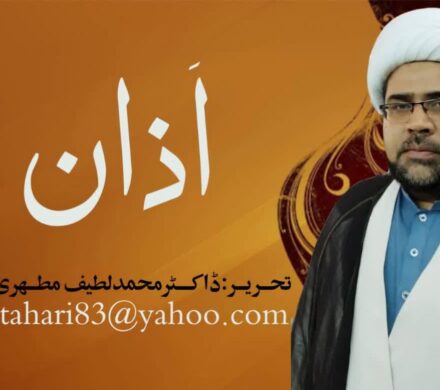
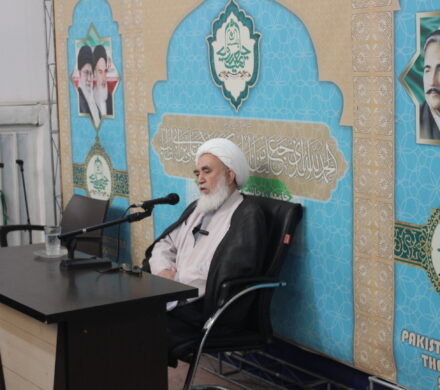
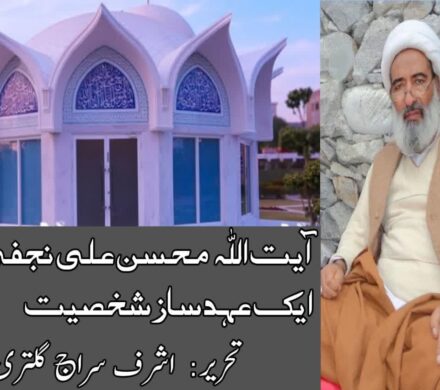



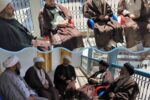

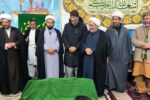

دیدگاهتان را بنویسید